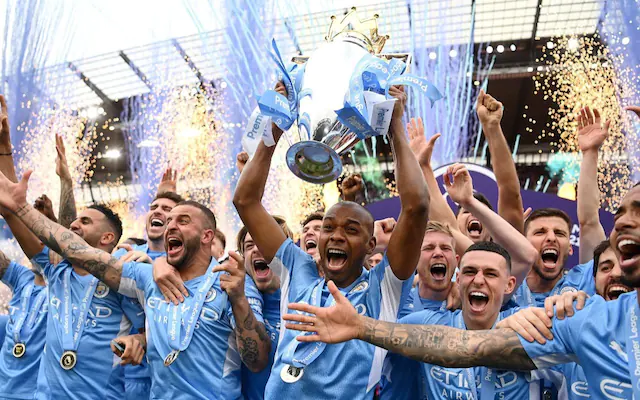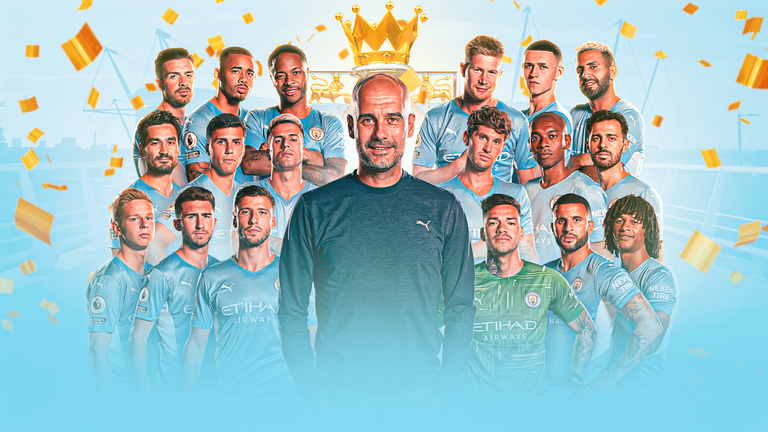Pep Guardiola compared Manchester City’s consistency in winning the Premier League to Alex Ferguson’s golden period when they attained the same level of dominance only days before they attempted to win their fourth league championship in five years. Perhaps it was a comment intended to add salt to their neighbours’ wounds. It’s possible that this was the case.

Citizens will undoubtedly assert this. Guardiola led City to their first ever dominating run on Sunday, capturing another title in a thrilling finish. His team fought back from a 2-0 deficit to defeat Aston Villa 3-2 and win the title in spectacular fashion, despite stiff competition from Liverpool.
When Sheikh Mansour purchased a cash-strapped City out of its life of neglect, their earliest days of catching up to an English football dynasty were seen as a’money can’t buy everything’ effort. City, on the other hand, stood firm, insisting that their football initiative had nothing to do with United. Despite the fact that everything indicated that the cultural importance of their club’s future rested on beating Manchester first, then England, and finally Europe.
The issue of how long the Manchester rivalry would survive was answered in 2011 when United won the league title on the last day. Sir Alex Ferguson may have returned to win the Premier League the following season, but the writing was on the wall.
Ferran Soriano and Txiki Begiristain, the architects of Barcelona’s legendary success in the late 2000s and early 2010s, were hired by City in 2012. The goal was to duplicate Barcelona’s ongoing success in Manchester. The proprietors of City Football Group then developed and unveiled a £200 million football campus, far surpassing Manchester United’s legendary junior facilities.
Manchester United began life after Ferguson and club CEO David Gill, just as City proceeded to roll out the red carpet for one of football’s greatest managers. It meant that Moyes, Falcao, Di Maria, Blind, Herrera, and Van Gaal were all brought in, failed, and departed United.
While Guardiola swept over the Bundesliga, City continued to wait. They finally got their crown gem in 2016, a transcendent manager who could ensure success and a route forward unlike any other. City, unlike any other team before them, broke financial norms throughout this period and in the years to follow. The Manchester club was in trouble after inflating sponsorship deals and infringing Financial Fair Play regulations, but when UEFA refused to budge, the Court of Arbitration Sport gave the Citizens a pass. Money began to speak, and titles began to flow.
Meanwhile, on the opposite side of town, a club that had previously focused on proactively seeking out the finest deals in the market was now aggressively attempting to smash British transfer records in a frantic bid to catch up to City. Jose Mourinho, an arch nemesis of Pep Guardiola, spent slightly under 315 million pounds on net transfers in three seasons at United. The money allowed Paul Pogba, Romelu Lukaku, and Zlatan Ibrahimovic to join Manchester United. Mourinho had a successful second season at United, winning the Europa League, FA Cup, and Carabao Cup, as he does at most teams.
Their main competition has been a resurgent Liverpool under Jurgen Klopp, who won the Premier League title for the first time in 2019 after spending significantly less but wisely. The one trophy he hasn’t won is the Champions League, but adding a striker like Erling Braut Haaland might mean that blemish is about to be erased as well.
Guardiola has addressed United on several occasions even today, just days before capturing his fourth league title in England. Ferguson’s enviable records are on the cusp of being broken, or how his Barcelona squad thrashed United in two Champions League finals, or even urging United fans to join City as long as they wore City’s blue shirts.











